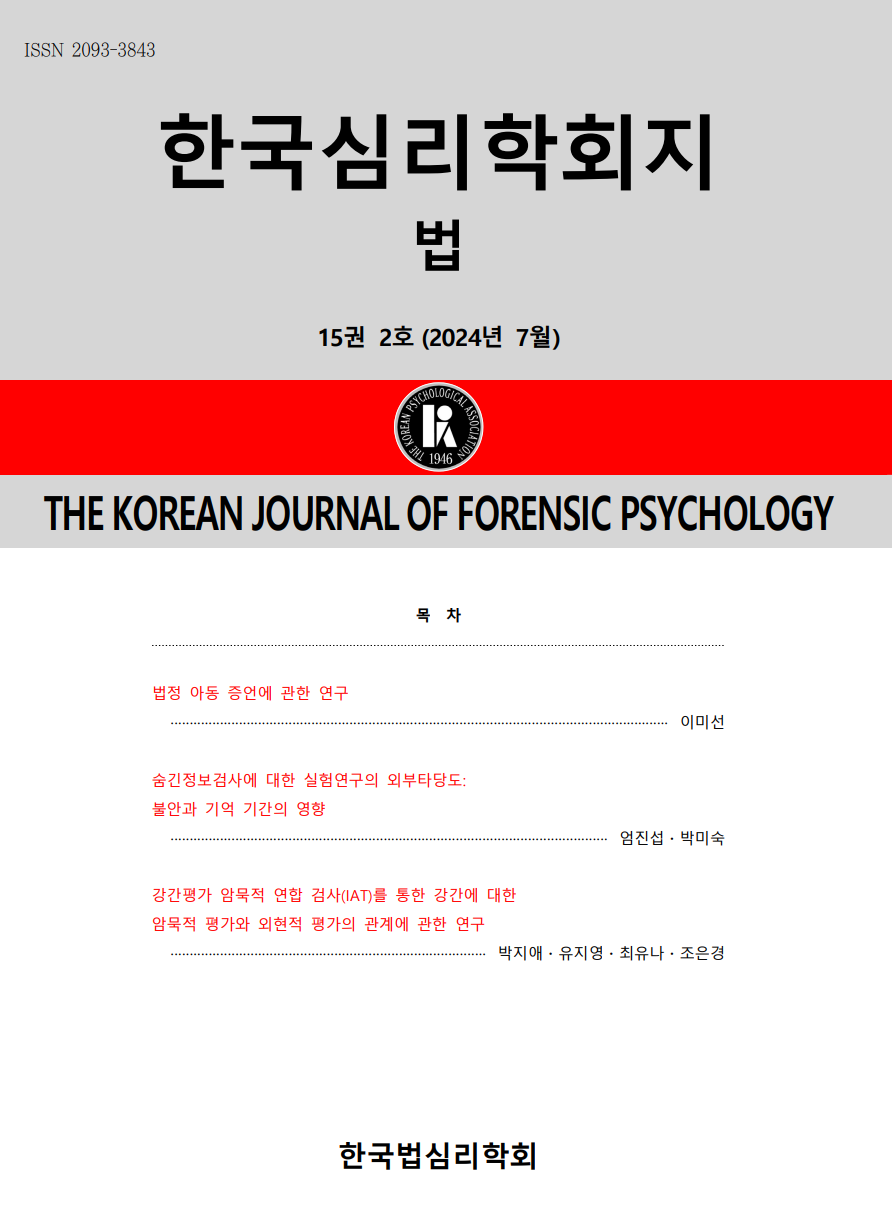open access
메뉴
open access
메뉴 ISSN : 2093-3843
ISSN : 2093-3843
This study was to examine whether the influence of perfectionism on the assessment of the target person';s responsibility is moderated by the target person's control of the situation. Multidimensional Perfectionism Scale(Hewitt & Flett, 1991) was administered to 123 college(graduate) students and 45 adults. Assessment of responsibility for a problem and that for a solution were each measured with 5 scenarios of accidents in which the target person either had or didn't have some control over the happening of the accident. The results of linear regression analysis showed significant interaction effects of the participant’s perfectionism and the target person's controllability on the assessment of responsibility for a solution. In the assessment of responsibility for a solution, the group that is high on both the self-oriented and other oriented perfectionism assessed more responsibility for the damages to the target person than other groups of different combinations of the self- and the other-oriented perfectionisms. The implications of the results were discussed for the judges' and jurors' judgments for legal disputes.
강에스더 (2008). 초월영성: 종교성 및 종교정향이 문제책임 귀인양식에 미치는 영향. 상담학연구, 9(3), 1389-1408.
김상희, 현명호 (2012). 평가 상황에서 완벽주의성향이 얼굴 표정 해석과 기억에 미치는 영향. 한국심리학회지 일반, 31(1), 27-44.
김연수 (1998). 성취관련 스트레스 경험 후 완벽주의와 자존감이 우울발생 및 지속에 미치는 영향. 카톨릭대학교 석사학위논문.
김현정, 손정락 (2006). 대학생의 완벽주의와자아존중감 및 우울, 주관적 안녕감 간의관계. 한국심리학회지: 건강, 11(2), 345-361.
모혜연 (2000). 청소년기 스트레스 요인과 완벽주의 성향이 우울에 미치는 영향. 서강대학교 석사학위논문.
박소영 (2002). 완벽주의와 정서의 매개변인으로서의 귀인양식과 스트레스 대처방식. 고려대학교 석사학위논문.
박지연, 양난미 (2014). 대학생의 사회부과적완벽주의와 사회불안의 관계. 한국심리학회지: 상담 및 심리치료, 26(2), 363-388.
박현주 (1999). 기능적 완벽주의 집단과 역기능적 완벽주의 집단의 구분 및 특성연구. 서울대학교 석사학위논문.
설미향, 이윤형 (2011). 다차원적 완벽주의와자기애가 열등감에 미치는 영향. 한국심리학회지: 발달, 24(3), 1-17.
심현경 (2011). 부적응적 완벽주의와 책임귀인이우울과 분노에 미치는 영향. 가톨릭대학교석사학위논문.
오유경, 김은정 (2014). 개인기준 완벽주의와평가염려 완벽주의가 삶의 만족도에 미치는 영향. 한국심리학회지: 건강, 19(4), 1167-1187.
유성은, 권정혜 (1997). 완벽주의적 성향, 사회적 지지, 스트레스에 대한 대처방식이 중년 여성의 우울에 미치는 영향. 한국심리학회지: 임상, 16(2), 67-84.
이미화 (2001). 완벽주의 성향의 순기능과 역기능: 성취목표, 스트레스, 심리적 안녕감, 우울과 관련하여. 한양대학교 석사학위논문.
이미화, 류진혜 (2002). 완벽주의 성향의 순기능과 역기능: 성취목표, 스트레스, 심리적안녕감, 우울과 관련하여. 청소년학연구, 9(3), 293-316.
정명인, 오수성, 신현균 (2005). 기능적, 역기능적 완벽주의자의 성공 및 실패 사건 경험에 대한 귀인. 한국심리학회지: 임상, 24(3), 709-719.
최바올, 고은영, 이소연, 이은지, 서영석 (2011). 부적응적 완벽주의, 무망, 우울, 심리적극통 및 자살사고의 관계. 한국심리학회지: 상담 및 심리치료, 23(3), 693-716.
한기연 (1993). 다차원적 완벽성-개념, 측정 및부적응과의 관련성. 고려대학교 박사학위논문.
홍혜영 (1995). 완벽주의 성향, 자기효능감, 우울과의 관계연구. 이화여자대학교 석사학위논문.
황지영 (2005). 대학생이 지각한 부모의 양육태도와 완벽주의 및 대인관계문제 간의 관계. 홍익대학교 석사학위논문.
Brickman, P., Rabinowitz, V. C., Karuza, J., Coates, D., Cohn, E., & Kidder, L. (1982). Models of helping and coping. American Psychologist, 37(4). 368-384.
Fincham, F., & Jaspars, J. (1979). Attribution of responsibility to the self and other in children and adults. Journal of Personality and Social Psychology, 37(9), 1589-1602.
Flett, G. L., Besser, A., & Hewitt, P. L. (2005). Perfectionism, ego defense styles, and depression: A comparison of self reports versus informant ratings. Journal of Personality, 73(5), 1355-1396.
Frost, R. O., Heimberg, R. G., Holt, C. S., Mattia, J. I., & Neubauer, A. L. (1993). A comparison of two measures of perfectionism. Personality and Individual Differences, 14(1), 119-126.
Frost, R., Marten, P., Lahart, C., & Rosenblate, R. (1990). The dimensions of perfectionism. Cognitive Therapy and Research, 14(5), 449-468.
Hamilton, V. L. (1978). Who is responsible? Toward a social psychology of responsibility attribution. Social Psychology, 41(4), 316-328.
Hamilton, V. L., & Sanders, J. (1981). The effect of roles and deeds on responsibility judgments:The normative structure of wrongdoing. Social Psychology Quarterly, 44(3), 237-254.
Hewitt, P. L., & Flett, G. L. (1991). Perfectionism in the self and social contexts:conceptualization, assessment, and association with psychopathology. Journal of Personality and Social Psychology, 60(3), 456-470.
Hewitt, P. L., & Flett, G. L. (1993). Dimensions of perfectionism, daily stress, and depression: a test of the specific vulnerability hypothesis. Journal of Abnormal Psychology, 102(1), 58-65.
Hewitt, P. L., Flett, G. L., & Ediger, E. (1996). Perfectionism and depression: Longitudinal assessment of a specific vulnerability hypothesis. Journal of Abnormal Psychology, 105(2), 276-280.
Hill, R. W., Zrull, M. C., & Turlington, S. (1997). Perfectionism and interpersonal problems. Journal of Personality Assessment, 69(1), 81-103.
Pacht, A. R. (1984). Reflections on perfection. American Psychologist, 39(4), 386-390.
Phares, E. J., & Wilson, K. G. (1972). Responsibility attribution: Role of outcome severity, situational ambiguity, and internal external control. Journal of Personality, 40(3), 392-406.
Piaget, J. (1962). The moral judgement of the child. New York: Free Press.
Rickard, L. N. (2014). Perception of risk and the attribution of responsibility for accidents. Risk Analysis: An International Journal, 34(3), 514-528.
Sherry, S. B., Hewitt, P. L., Flett, G. L., Lee-Baggley, D. L., & Hall, P. A. (2007). Trait perfectionism and perfectionistic selfpresentation in personality pathology. Personality and Individual Differences, 42(3), 477-490.